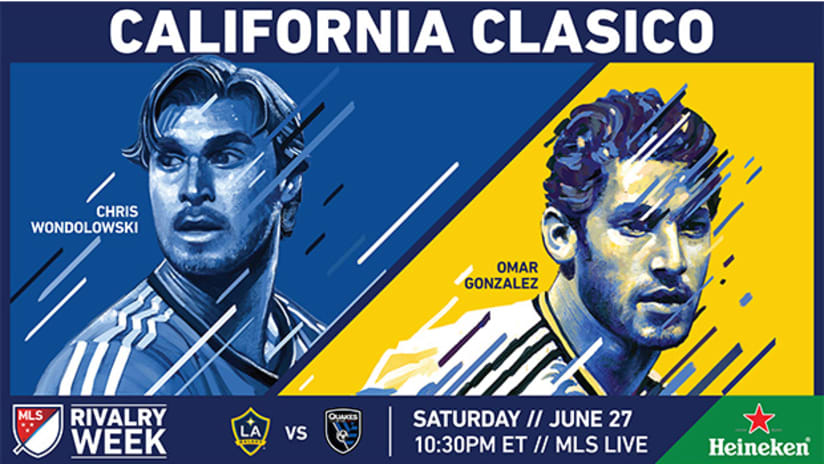From the start of Major League Soccer, the San Jose Earthquakes-LA Galaxy rivalry has always been the rivalry that all other rivalries are measured by. The battle between NorCal and SoCal has been defined by dramatic victories, outstanding individual performances, amazing comebacks and championships.
Here are eight reasons why #SJvLA has no equal when it comes to MLS rivalries.
- TICKETS:Quakes vs. Galaxy
Playoff Meetings
The Quakes and Galaxy have squared off five times in the MLS Cup Playoffs and all five matchups have gone down to the wire. The 1996 Clash-Galaxy series saw the underdog team from San Jose push LA to three games before falling to the eventual league runners-up. The Quakes then defeated the Galaxy 2-1 in overtime in the 2001 MLS Cup Final, before coming back from four goals down to beat LA in 2003 in a two-game series (more on those later). The Galaxy knocked off San Jose in 2005 and 2012 in the playoffs in two tightly contested series.
Top Coaches
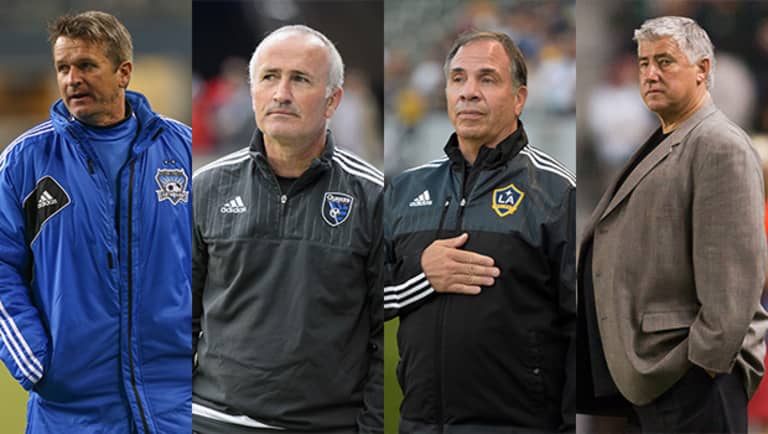
The NorCal-SoCal duel has featured the best head coaches in the history of the league throughout the majority of the rivalry.
In the early 2000s, Frank Yallop (127 MLS wins) and Dominic Kinnear (145 MLS wins) led the Quakes against the Sigi Schmid (216 MLS wins) and the Galaxy. Following San Jose’s return to MLS, Bruce Arena (182 MLS wins) has patrolled the Galaxy sideline while Yallop and Kinnear have again been the principal figures for San Jose.
Those four coaches are the winningest coaches in MLS history and all four have won multiple MLS Cups.
Greatest Game in MLS History
It is fitting that the league’s greatest rivalry features the greatest game in MLS history.
In the 2003 Western Conference Semifinals, the Quakes and Galaxy went head-to-head in a two-game aggregate goal series. In Game 1 at the StubHub Center, the Galaxy jumped all over the Quakes and earned a 2-0 victory to grab the upper hand heading to Spartan Stadium for Game 2. Yallop made a number of lineup changes for the second leg and what happened next is the stuff of legends. The Galaxy quickly went up 2-0 to lead 4-0 overall in the series with 75 minutes to go. When Jeff Agoos scored a well-placed free kick to bring it to 4-1, the Quakes got a little life and Spartan erupted just before halftime when surprise starter Jamil Walker found Landon Donovan for the second goal. Coming out of the break, Walker popped up again, heading home a quickly taken free kick from Richard Mulrooney.
With Spartan Stadium ready to explode, the home crowd was forced to gut out forty edge-of-your-seat minutes before another unlikely hero wrote his name forever in Earthquakes lore. Mulrooney danced around a defender on the endline before whipping a cross to the back post, where Chris Roner rose up and headed past a wrong-footed Kevin Hartman. The match was tied and delirium reigned in San Jose. With the Galaxy buckling, Rodrigo Faria, who made only four regular season appearances in his Quakes career, scored six minutes into overtime, making Spartan Stadium shake like it never had before.
The comeback was complete and the Quakes had eliminated their biggest rivals in what many observers still view as the league’s greatest game. San Jose would go on to capture the club’s second MLS Cup two weeks later.
Greatest Regular Season Game in MLS History
Not only did the Quakes and Galaxy tussle in the greatest playoff game, but a strong argument can be made for the San Jose vs. LA game on June 30, 2012 at Stanford Stadium as the greatest regular season game in MLS history.
The match featured Chris Wondolowski, Steven Lenhart and the Goonies against David Beckham, Landon Donovan and a loaded Galaxy side in front of a packed house of 50,391 fans. After an early Lenhart goal put the Quakes up 1-0, the Galaxy blitzed the Earthquakes for three goals in 10 minutes, including a free kick by Beckham and a clean Donovan finish. Victor Bernardez breathed some life back into San Jose with a half-volley just before halftime from a Marvin Chavez corner. Coming out in the second half, the Quakes were without starting goalkeeper Jon Busch, whose eye had swollen shut after a collision. Then-backup keeper David Bingham would prove vital in the late stages.
After the interval, Sam Cronin slid a shot past Josh Saunders after a Lenhart flick and San Jose had suddenly equalized. Wondolowski then appeared and proved why he was the league MVP in a moment of brilliance. Chavez curled in a corner kick and Wondo peeled off his mark and back-heeled a shot past Saunders and between two Galaxy defenders for a 4-3 advantage. He then celebrated in style by saluting a group of military members who were watching the game from field level. With the Galaxy pressing for the tying goal, Bingham came up big a number of times for San Jose, including an incredible diving save on a Beckham breakaway in the closing minutes. When the final whistle blew, the Quakes had the win and were well on their way to a Supporters’ Shield.
Changing Sides
Nothing makes a rivalry fiercer than when principal figures in the narrative change sides or go from villain to hero. This rivalry has big history of key players changing sides. Here are the players that have suited up for both sides:
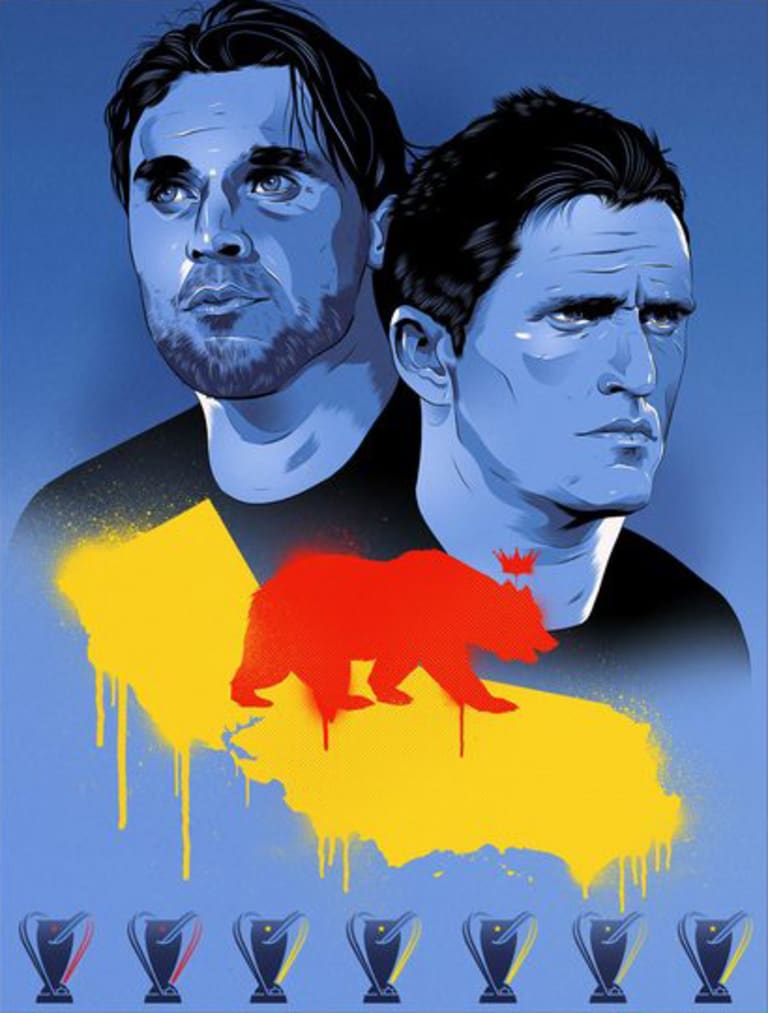
Chris Aloisi
Danny Califf
Joe Cannon
Brian Ching
Landon Donovan
Todd Dunivant
Simon Elliott
Adam Frye
Dan Gargan
Cornell Glen
Gavin Glinton
Alan Gordon
Ned Grabavoy
Kelly Gray
Ty Harden
Zak Ibsen
Harut Karapetyan
Jovan Kirovski
Eddie Lewis
Brandon McDonald
Alejandro Moreno
Brian Mullan
Ian Russell
Craig Waibel
Two Minutes of Madness
One year after the great comeback win of 2012 against the Galaxy at Stanford Stadium, the Quakes outdid themselves with a dramatic finish for another California Clasico victory.
Down 2-0 with 25 minutes to play, the Quakes staged one of the greatest comebacks in team history. Alan Gordon scored on a header from a Shea Salinas cross to cut the deficit to one in the 68th minute.
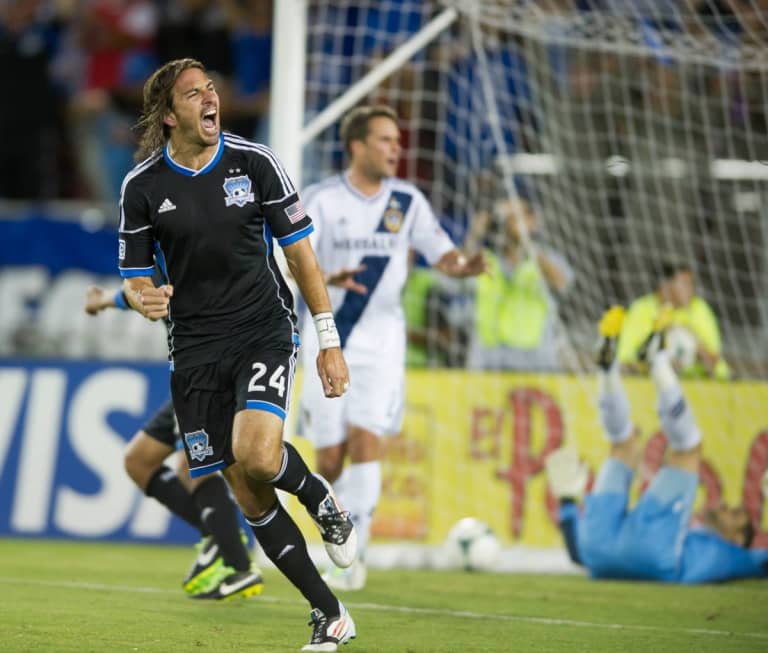
Following a red card to Victory Bernardez, San Jose entered second half stoppage time down a goal and a player. Salinas tied the game by knocking home a loose ball in the box following a redirected throw-in from Justin Morrow. With the crowd still on its feet celebrating Salinas’ goal, Marvin Chavez found Salinas again at the back post. He adroitly played the ball back to Sam Cronin, who appeared ready to shoot. Instead, he calmly lofted a ball to the back post for Gordon, who slammed home his second goal of the match to send the fans into a frenzy.
The game marks the only time in team history that San Jose has scored two goals in stoppage time to turn a defeat into a victory – and they did it with just 10 men.
Donovan
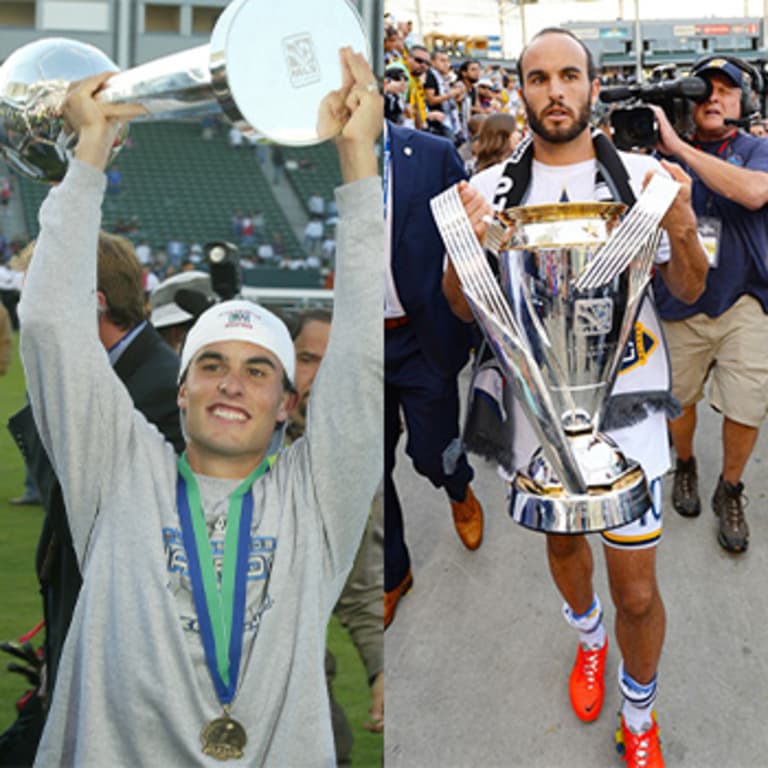
One of the biggest topics in the history of the rivalry is the story of Landon Donovan
As a 19-year old, Donovan joined the Quakes in 2001 and helped lead them to two MLS Cups, while on loan from Bayer Leverkusen in Germany. He was a big part of a number of wins over the Galaxy during his time in San Jose. Following the 2004 season, he departed MLS for Leverkusen, only to return home after a few months to join the Galaxy in March of 2005. The controversial return to MLS as a member of the Galaxy stoked the flames in a big way.
In his first return to San Jose in 2005, the fans expressed their discontent through signs, banners and boos. The Quakes took that first meeting 3-0 and defeated the Galaxy two more times that season. Donovan remained a lightning rod for Quakes fans throughout the rest of his career, which he finished with six MLS Cups and the all-time scoring record in MLS.
MLS Cup 2001
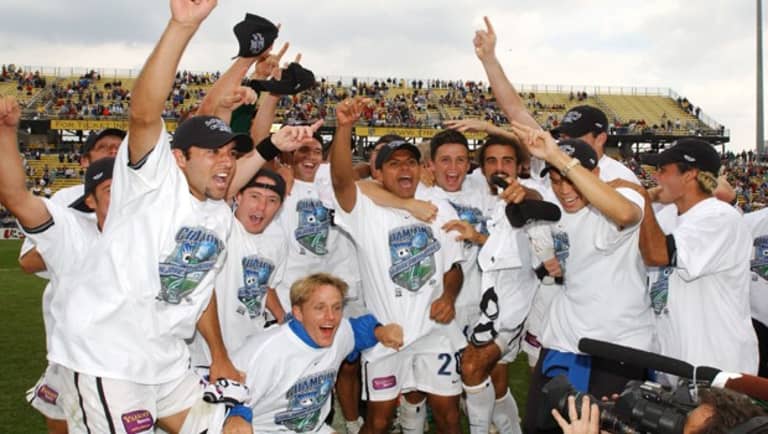
During the first five seasons of Major League Soccer, the LA Galaxy established themselves as one of the league’s model clubs, earning two MLS Cup final berths and qualifying for the playoffs every season.
The Clash/Earthquakes had a good start in 1996, but followed that playoff season up with four straight seasons in which they missed the postseason. The season opener in 2001 was scheduled for April 7 at the Rose Bowl between a revamped Quakes team and another strong Galaxy side. In strong portent for the rest of the year, San Jose exploded for three first-half goals – one each from Troy Dayak, Ronald Cerritos and Dwayne De Rosario – en route to a 3-2 season-opening win. The stellar play from opening night carried through the rest of the year that saw San Jose post the best record in club history and qualify for the playoffs. After storming through the quarterfinals and semifinals, the Quakes found the Galaxy awaiting them in the final.
All season long, San Jose had thrived on scoring first and holding a lead, but in the MLS Cup in Columbus, it was the Galaxy who jumped on top first through Luis Hernandez. The Mexican international perfectly volleyed a long ball from Greg Vanney past Quakes goalkeeper Joe Cannon for a 1-0 advantage. With time running down in the first half, the Earthquakes tied the score with a wonder strike from Landon Donovan. Ian Russell found Richard Mulrooney down the right wing and he whipped a one-timed cross into the box. Donovan pulled free of Ezra Hendrickson and crushed a half-volley into the upper corner past Kevin Hartman.
Despite dominating the second half, the Quakes could not find the winner and the match headed to overtime. Frank Yallop inserted two second-half subs into the match that would both play a part in the winner. Six minutes into overtime, substitute Zak Ibsen played a pass to Ronnie Ekelund, who quickly picked out another sub, Dwayne De Rosario, with a long pass. De Rosario found himself one-on-one with Danny Califf and went right at him. After a few jukes, he unleashed a curling shot to the far post that nicked Califf on the way by and found its way past the outstretched fingertips of Hartman. The Quakes had the biggest victory in franchise history and it had come against their biggest rival.
That victory turned up the heat on the rivalry and helped drive the two clubs to a combined four MLS Cups in the next five years.

